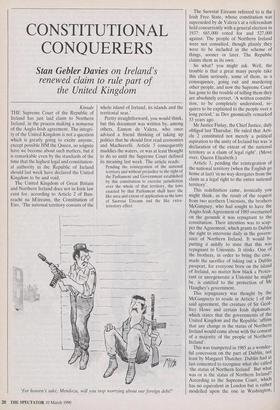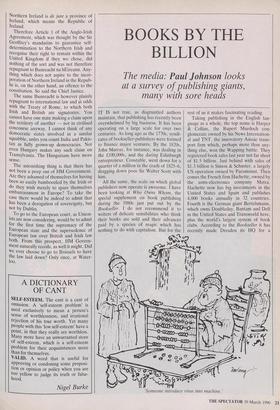CONSTITUTIONAL CONQUERERS
Stan Gebler Davies on Ireland's
renewed claim to rule part of the United Kingdom
Kinsale THE Supreme Court of the Republic of Ireland has just laid claim to Northern Ireland, in the process making a nonsense of the Anglo-Irish agreement. The integri- ty of the United Kingdom is not a question which is greatly going to excite anyone, except possible HM the Queen, so soignée have we become about such matters, but it is remarkable even by the standards of the time that the highest legal and constitution- al authority in the Republic of Ireland should last week have declared the United Kingdom to be and void.
The United Kingdom of Great Britain and Northern Ireland does not in Irish law exist for, according to Article 2 of Bun- reacht na hEireann, the Constitution of Eire, 'The national territory consists of the whole island of Ireland, its islands and the territorial seas.'
Pretty straightforward, you would think, but this document was written by, among others, Eamon de Valera, who once advised a friend thinking of taking up politics that he should first read economics and Machiavelli. Article 3 consequently muddies the waters, or was at least thought to do so until the Supreme Court defined its meaning last week. The article reads: Pending the reintegration of the national territory and without prejudice to the right of the Parliament and Government established by this constitution to exercise jurisdiction over the whole of that territory, the laws enacted by that Parliament shall have the like area and extent of application as the laws of Saorstat Eireann and the like extra- terrotory effect.
Tor heaven's sake, Mendoza, will you stop worrying about our foreign debt?' The Saorstat Eireann referred to is the Irish Free State, whose constitution was superseded by de Valera's at a referendum held concurrently with a general election in 1937: 685,000 voted for and 527,000 against. The people of Northern Ireland were not consulted, though plainly they were to be included in the scheme of things, sooner or later. The Republic claims them as its own.
So what? you might ask. Well, the trouble is that a great many people take this claim seriously, some of them, as a consequence, going out and murdering other people, and now the Supreme Court has gone to the trouble of telling them they are absolutely correct. 'A written constitu- tion, to be completely understood, re- quires to be explained to the people over a long period,' as Dev gnomically remarked 53 years ago.
Mr Justice Finlay, the Chief Justice, duly obliged last Thursday. He ruled that Arti- cle 2 constituted not merely a political aspiration to the unity of Ireland but was 'a declaration of the extent of the national territory as a claim of legal right'. (Move over, Queen Elizabeth.) Article 3, pending the reintegration of the national territory (when the English go home at last) 'in no way derogates from the claim as a legal right to the entire national territory'.
This redefinition came, ironically you might think, as the result of the request from two northern Unionists, the brothers McGimpsey, who had sought to have the Anglo-Irish Agreement of 1985 overturned on the grounds it was repugnant to the constitution. Their intention was to scup- per the Agreement, which grants to Dublin the right to intervene daily in the govern- ance of Northern Ireland. It would be putting it mildly to state that this was repugnant to Unionists. It stinks. One of the brothers, in order to bring the case, made the sacrifice of taking out a Dublin passport, for everyone born on the island of Ireland, no matter how black a Protes- tant or unregenerate a Unionist he might be, is entitled to the protection of Mr Haughey's government.
This repugnancy was thought by the McGimpseys to reside in Article 1 of the said agreement, the creature of Sir Geof- frey Howe and certain Trish diplomats, which states that the governments of the United Kingdom and the Republic 'affirm that any change in the status of Northern Ireland would come about with the consent of a majority of the people of Northern Ireland'.
This was trumpeted in 1985 as a wonder- ful concession on the part of Dublin, not least by Margaret Thatcher. Dublin had at last consented to recognise what she called `the status of Northern Ireland'. But what was or is the status of Northern Ireland? According to the Supreme Court, which has no equivalent in London but is rather modelled upon the one in Washington, Northern Ireland is de jure a province of Ireland, which means the Republic of Ireland.
Therefore Article 1 of the Anglo-Irish Agreement, which was thought by the Sir Geoffrey's mandarins to guarantee self- determination to the Northern Irish and recognise their right to remain within the United Kingdom if they wo chose, did nothing of the sort and was not therefore repugnant to Bunreacht na hEireann. Any- thing which does not aspire to the incor- poration of Northern Ireland in the Repub- lic is, on the other hand, an offence to the constitution. So said the Chief Justice.
The same Bunreacht is however plainly repugnant to international law and at odds with the Treaty of Rome, to which both Irish and British are signatories. You cannot have one state making a claim upon the territory of another — not in civilised concourse anyway. I cannot think of any democratic states involved in a similar squabble, unles you count India and Pakis- tan as fully grown-up democracies. Not even Hungary makes any such claim On Transylvania. The Hungarians have more sense.
The astonishing thing is that there has not been a peep out of HM Government. Are they ashamed of themselves for having been so easily bamboozled by the Irish or do they wish merely to spare themselves embarrassment in Europe? To take the case there would be indeed to admit that has been a derogation of sovereignty, but not by Dublin.
To go to the European court, as Union- ists are now considering, would be to admit for the first time the supremacy of the European state and the supersedence of European law over British and Irish law both. From this prospect, HM Govern- ment naturally recoils, as well it might. Did we ever choose to go to Brussels to have the law laid down? Only once, at Water- loo.



























































 Previous page
Previous page